#RUSSIAN SISTER SUPREMACY
Text
One term you may sometimes hear in socialist circles is “red-brownism.” In this color scheme, the red refers to socialism, and the brown refers to fascism — the implication being that the ideology bridges fascist and socialist politics. The most overt example of this is a NazBol or National Bolshevik, a movement that originally started essentially as Nazism for people who idolize Stalin instead.
This phenomenon is not new. In Nazi Germany, the Strasser Brothers, Gregor and Otto Strasser, promoted a strain of thought in the Nazi Party along these ideological lines, hoping to appeal to members of communist and socialist parties prior to when those groups were targeted for repression. These were sometimes called “beefsteak Nazis.”
Contemporary commentators might try to equate it to the so-called “horseshoe theory,” which suggests that going too far left or right brings one to a similar point. Red-brownism does not validate this theory. Rather, it may better be thought of as a form of marketing, infiltration, and recruitment targeted towards those on the opposite end of the spectrum.
Many modern fascist movements are influenced by the works of Aleksandr Dugin, whose Fourth Political Theory advocates such syncretism as its core ideology. Though passing itself off as different than fascism, decrying Hitler as having gone to too great an extreme, the reality is that the ultranationalist, traditionalist ethnostates it advocates are not radically different.
This line of thinking is often subversive. Many socialists follow the commentary of Glenn Greenwald and Michael Tracey, who have developed a recent reputation for appearing regularly on Tucker Carlson, whose political views are fascistic. These appearances usually consist of them all happily gloating together at some mistake on the part of liberalism — which often invites parts of the socialist left to partake as well.
A non-red-brown Carlson appearance is, perhaps, one that will not get aired — Rutger Bregman’s unaired interview in which he skewered Carlson for his political views and faux anti-elitism.
Red-brown media works the other way as well, where ostensibly left-wing shows play host to fascistic figures, whose views are whitewashed on the show. For instance, Loud & Clear on Sputnik radio, a Russian state media network, has platformed all sorts of fascist and white nationalist leaders. Sputnik and its sister network RT largely seem to be ways to launder both fascistic ideas and Russian geopolitical goals to the global audience.
Countering this is not easy, though there are two areas one can focus on in order to help push out these ideas: internationalism and the needs of marginalized groups. Both of these run counter to the goals of this fascistic process, which seeks strong borders, isolationism, and a lack of diversity. We must work across borders to build movements to solve today’s now global problems and make sure that we do not play into ploys to recreate the sorts of oppression that enable fascism to take hold such as white supremacy, misogyny, cisheterosexism, and ableism.
Beware of sources and communities caught up in just being a contrarian view of everything. Remember that, as easy as it is to get frustrated about the failure of the Democrats to deliver on a lot of desperately necessary policy in recent decades, they aren’t a threat in the way fascists are. Do not let the dopamine rush of “owning the libs” take precedent over anti-fascist work. Never let concern for human rights be swept by the wayside.
Red-brownism propagates especially easily when the discourse is dominated by cis white men, who have little to lose by taking a “class-first” or even “anti-idpol” stance on issues that affect marginalized groups.
We can stop this from destroying the Left once again and build a movement based on solidarity, intersectionalism, and internationalism — one that addresses these concerns but will ultimately still appeal to anyone committed to building a world where everyone has a sustainable, high standard of living.
#this is old (from 2019) but still EXTREMELY FRIGHTENINGLY RELEVANT#we need to talk more about red-brownism on this website tbh#politics#article
12 notes
·
View notes
Text
Madness Combat Headcanons
Here is the list of my headcanons! They'll be weird and quirky but just go with it, this is my blog afterall.
Hank
35 Y/o
Goes by They/Them, Asexual
Half Russian
Body shape: Wal- I meam rectangular
Hank has a grandmother named Svetlana
Sanford
31 Y/o
Goes by He/Him, MLM
Half Malay
Body shape: Inverted triangle
Deimos
29 Y/o
Goes by He/They, Bi
Columbian
Body shape: Triangle and no, he is not a fucking twink
Has an auntie names Rosetta
2BDamned
??? Y/o
Goes by He/They/She, Asexual
Secretly an Employer
Body type: He can manipulate his appearance but he usually has a dad bod, has some strong arms
Tricky
45 Y/o
Goes by He/Clown, Transmasc MLM
Just a silly guy
Body shape: Round, chubby Tricky supremacy love him!
Jebus
48 Y/o
Goes by He/Him, MLM
Half Greek
Body shape: Inverted triangle, he's got that snatched waist-
Sheriff (Sean)
45 Y/o
Goes by He/Him, Pan
Body type: Twig, now this is a twink
Has a sister named Ellanore
Auditor
??? Y/o
Goes by He/She/They, Genderfluid
Body shape: Hour glass but with slightly broader shoulders
He is related to the other Employers plus 2BD is his twin
Phobos
28 Y/o
Goes by They/Them, Queer
Columbian
Body shape: I'm torn between him being rectangular or an inverted triangle
Has an auntie named Rosetta
Non-canon characters
Hapi/Skittles
35 Y/o
Goes by He/They/Candy, MLM
Half Russian
Body shape: Rectangular, is as beefy as his brother but uses it for good
Wank (Wanda)
35 Y/o
Goes by She/He, Lesbian
Can speak Korean
Body shape: Hourglass love a curvy Wank
Pank (Parker)
35 Y/o
Goes by He/She/They, MLM
Can speak French
Body shape: Inverted triangle
Trixie
40 Y/o
Goes by She/Xer/Clownself, Lesbian
Body shape: Pear, gorgeous hips!
You can tell I like men with snatched waists-
5 notes
·
View notes
Photo


diagon alley is home to many , a direct connection to the wizarding world , right in the centre of london , many people like bellatrix black , spend majority of her time in the busy alley , people know her as the thirty-three year old who is a past slytherin graduate , now working as a unspeakable, i think the role suits them perfectly as i think they are ambitious but also they can be intolerant, but that's just my opinion . (faceclaim; Crystal reed, penned by ; laurie/24/gmt )
&. BASICS
full name: bellatrix walburga black. nicknames: bella. age: 34. sexuality: she has never really labelled her sexuality, but she’s drawn to power. birthday: august 5th. place of birth: 12 grimmauld place, islington, london. gender & species: cis female, human, witch. current location: london, england
&. MORE BASIC INFO
languages: english, french and russian,. religion: non-religious, except for perhaps blood supremacy. education: hogwarts (slytherin) - OWLs, with 6 Os and 3 Es, and NEWTs, with 4 Os and an E. occupation: unspeakable within the death chamber. drinks, smokes, & drugs: frequently, regularly, occasionally
&. PERSONALITY
zodiac sign: leo. MBTI: ESTJ-A, the executive. fears: the fall of blood purity. four positive traits: intelligent, ambitious, loyal, determined. four negative traits: intolerant, unforgiving, manipulative, arrogant
Tw: Bigotry, Violence and Implied: Murder and Torture
chapter one. childhood:
An heir. That was all that Cygnus Black III wanted. Everything he had done in his life was for The Noble and Most Ancient House of Black and, with his older brother Alphard not even betrothed and sister Walburga married to their second cousin but without her own son, when Druella fell pregnant for the first time it was his duty to ensure that they raised the perfect pureblood boy to secure the family legacy. Imagine his disappointment when Bellatrix Walburga Black was born. Eventually, the new father resigned himself to the truth. He assured everybody that his daughter would be raised just as well as any son would be and that his heir would come with the next. It was years before another Black was added to the infamous family tree. Whispers circulated around high society circles, talk that perhaps this was finally the fall of the Noble and Most Ancient House of Black. Now if Cygnus could help it. No longer were they waiting for the heir apparent, he would simply mould one from his oldest daughter.
By the time the younger two Black sisters were born, Bellatrix was already being transformed from future potential pureblood wife to successor to everything The Blacks held dear. Her childhood was filled with occlumency and legilimency lessons, and she much preferred them to the horror stories of etiquette lessons to become the perfect lady that other daughters of the Sacred Twenty-Eight told. She was permitted access to her father’s office, where they would spend hours at a time talking about the purity of their blood, toujours pur, and the threats that faced their very way of life. On many warm Sunday afternoons she chose to visit her Aunt Walburga, preferring to run her hands along the family tapestry rather than play in the sunshine with her sisters and cousins.
chapter two. hogwarts:
By the time she was at Hogwarts, proudly sorted into Slytherin just like every Black before her, she was everything that family expected her to be. Everything they could have wanted. The perfect son her father had never had.
Bellatrix had never been made to be subtle, even as a mere eleven year old she had been outspoken. After all, she had all the confidence of a girl who had been promised the world because of the blood that ran through her veins. She sneered at blood traitors and did worse to muggleborns, landing herself many a detention and building herself a reputation that made her as feared as any of the Slytherin boys she’d associated herself with. She was a favourite of her Head of House, a powerful witch Horace Slughorn couldn’t ignore her potential, but was ultimately rejected as prefect for her behaviour. Truly the young girl hadn’t been bothered. After all, why would she need a shiny badge and the power to grant detentions when she had hexes and curses to throw in the direction of people she felt were undeserving of their Hogwarts’ space?
chapter three. the war:
The summer after her final year at Hogwarts changed Bellatrix’s life. Now an adult, her mother made clear what was expected of her. She may not have been the lady that Druella had once pictured, but that didn’t stop her mother from parading eligible suitor after eligible suitor under her nose. Bella found the whole thing rather boring. Despite the birth of her younger cousins, effectively dethroning her from her once prized position as heir to their fortunes, she still very much considered herself the true heir - after all, she had done the work while they had merely been born boys over a decade later - and didn’t see why she should have to prove herself worthy of any man. Especially when it seems so clear to her she was leagues above anybody her mother suggested. Those long summer days were filled with arguments with her mother, familiar talks with her father, hiding from her annoying cousins and half-reluctantly spending time with her sisters. A routine began to settle. And then she met him. Tom Riddle.
It didn’t take long from that first meeting, where they spoke of the same things she had with her father years before with the teenager hanging onto every word while Riddle offered up his solutions, for her to become enthralled with the man. They would eradicate the unworthy, be able to break free from their secrecy and take what was rightfully theirs. Wizards would live in the light, heads held high and proud rather than forced into hiding out of fear. He had made it all sound so simple. She didn’t hesitate in joining his army, after all the victory would be so much sweeter when she’d been the one to help win the war.
She is a delighted participant in the war. She considers herself an activist, she is fighting for everything she’s been taught to stand for and is upholding values generations of her family have lived by, if the means she uses should be violent then it so be it. She’s never had a problem with squeamishness before. At her core there is anger, fuelled by a fear that the world she loves will give way to the muggle loving blood traitors and the filthy blood that dared to think they could infiltrate their sacred blood. By the time Sirius joins the blood traitors, officially removed from the tapsry she spent hours of childhood admiring, she is not surprised. Now he’s just another enemy with a target on his back as she rises through Riddle’s ranks and becomes one of The Dark Lord’s most trusted soldiers. One of the deadliest too. For those unlucky enough to run into Bellatrix Black on the battlefield it has become apparent that they are unlikely to survive.
She is exactly who she was raised to be. A proud member of the House of Black, a soldier for all she finds righteous, and with a Lestrange heirloom ring sitting on her left hand she even has the perfect pureblood fiancé. What Bellatrix wants she always gets. And now, she wants to win the war.
4 notes
·
View notes
Text
Wednesday Wisdom: Books of This Week!
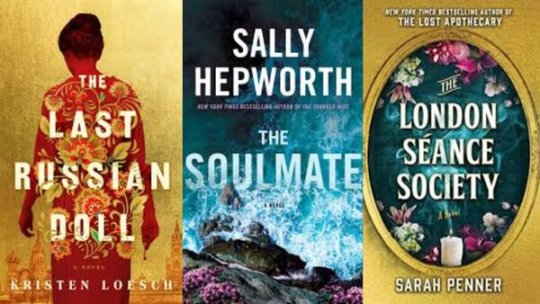
WhatsOn brings the book selection for the week. Immerse yourself in the books on the list to feed your inner bibliophile. Enjoy yourself this week by occupying yourself with the new books in your home.
Weyward
In his debut book author showed, three generations of women fight against the restrictions of patriarchy.
The Weyward women of Crows Beck in Cumbria, England, have shared a special talent for connecting with nature and appearing to converse with animals for generations. However, they are all also victimized various forms of abuses and control by males.
Altha, a healer, placed on trial for witchcraft in 1619 after being spotted nearby a field. Where a farmer crushed by his cows and because her mother was thought to be a witch because of her work treating residents of the village.
In the early 1940s, hundreds of years later, Violet Ayres fights to uncover the truth about her mother. Elizabeth Weyward passed away mysteriously when Violet was a young girl, as well as her father's oppressive scrutiny and control.
In present day, Kate Ayres has left her abusive live-in boyfriend before he learns that she is pregnant. She has taken shelter in her great-aunt Violet's cottage as she works to rebuild her life and protect her unborn child. The ways in which women are subjected to the whims and cruelties of male supremacy are chilling and realistic. Even though at times it feels like the women's link to nature adds an unnecessary dose of the supernatural to this already suspenseful book. Although some of the plot twists are unlikely to particularly startle readers. This is still a compelling book that captures the ways patriarchy has attempted to impose restrictions on women throughout history. As well as the ways in which women have discovered to create their own paths to freedom.
This book, which is thoughtful as well as awful, is an effective fusion of historical fiction and contemporary feminism.
Weyward
The London Séance Society
The sensational bestseller THE LOST APOTHECARY's author wrote a spellbinding story . Two courageous women who seek justice and the truth in the dangerous practice of calling the deceased.
Vaudeline D'Allaire, a renowned spiritualist, is about to conduct a sinister séance at a deserted château outside of Paris. She is highly sought after by both widows and investigators due to her skill at calling the spirits of murder victims to discover the identities of the perpetrators. Lenna Wickes has traveled to Paris in search of information regarding her sister's passing. However in order to do so, she must accept the unknown and get over her own bias against the occult based on reasoning. Lenna travels with Vaudeline when she is invited to England to investigate a prominent murder as a role of a student. But as the women work together with the strong males of London's elite Séance Society to solve the mystery, they start to worry that they might actually be involved in the crime they are trying to solve.
The London Seance Society
The Soulmate
Prepare yourself for Sally Hepworth's The Soulmate. A gripping, addictive novel about marriage, betrayal, and the secrets that drive us to the brink.
On a cliff, there is a house. Dream residence for Gabe and Pippa in a sleepy coastal town. But something evil is hidden in their picture-perfect home. People frequently choose to commit suicide on the high peaks. Gabe physically talks them off the ledge each night as he comes to their aid. as long as he doesn't.
When Pippa learns Gabe knew the victim, the questions rise... did the victim jump? Did she push?
And would Gabe, Pippa's soul mate and the happiness of her life, lie? The deadliest secrets start to come to light as their marriage's flawless facade starts to fall apart.
The Soulmate
The Last Russian Doll
Three generations of Russian women followed in this mysterious, epic book about betrayal, retaliation, and redemption. As it chronicles the enduring love story at its core throughout the 1917 revolution and the final days of the Soviet Union.
In an ancient world, a long-ago country...A young girl and her family—a sibling, a father, and an eccentric mother who enjoyed collecting porcelain dolls and telling fairy tales—lived contentedly in Moscow. Everything changed one summer night, leaving only the girl and her mother from that family. Rosie has an English name, a caring fiancé, and a bright future now that she is studying at Oxford University. But what she wants is to comprehend—and forget—the past. After her mother passes away, Rosie travels back to Russia with only a single key and her mother's peculiar tradition. The shocking family history she uncovers includes the 1917 Revolution, the Leningrad siege, Stalin's purges, and more.
The Last Russian Doll
A young noblewoman named Tonya, who is as pretty as a porcelain doll and the protagonist of this saga, is at the center of a grand narrative that spans the entire century thanks to her deeds and her love for an idealistic man....
Read the full article
0 notes
Text
What is desirable difficulty for East Asians? In context for East Asian born in the west and a western East Asian in Sino-technosphere.
I don’t people realize how far removed they are from how things are made or even developed even as a person who went to college. Like if your sassy you talk about data, and it’s mostly marketing. Like how is development happen in your neighborhood. Like literally no clue.
I’ve watched YouTube for about five years and it literally did not capture anything about either technosphere in either side. And I still watch YouTube and like there’s like not even news clips of current political environments. Like I have to watch tv news which is a little sensational.
I go the the library all the time and I haven’t found a good book on either technospheres. On top of that barrier, people are weird when you talk about what is personal responsibility and what’s layered systems responsibilities. Like I guess the conversation can be very binary or reactionary because nobody talks about front of east commmunist turned Darwinistic technosphere in East Asia and like the west’s capitalizing on their white supremacy techno-schlock. Like yes there should be conversations about how technology blurs the line between human and machine. Like how difficult is it to have a place where you meet and talk about a cultural book you just read. Like you shouldn’t have to go to the city to figure that out or that their are only two high-profile advocates on crisis. I think it’s Naomi Klein for climate change, which sometimes I look back on her work and it kind of like looks like a front for privatizing climate change machines/products and she’s also one of the high profile people for the green new deal which also doesn’t talk about the hierarchy of guaranteed jobs, like where are the questions about who monopolizes all this information of climate tech and like what can the people do. Then I also think there’s Yuval Noah Harari on human tech/the parts of new technological frontier which he calls Homo Deus which is very clever because I guess globally the middle class have been doing homo economics. And yeah it’s fun to think and be a person who gets to be the face of new human tech but like guys it’s a monopoly, do you think somebody like Richard Brandson wants to be on the same yacht as you. I think Dr. Fauci is the face of COVID-19 which he has recently stepped down but it’s still very much a western deal even though I believe it started in China. Bill Gates is the next face of COVID-19 and global health initiatives. There’s also the racial inequality which has been around for awhile and it took 5 years to find a book by an African American economist. 5 years. Then there’s the Russian-Ukraine war which is very recent still but that’s also a western deal which I’m still very confused by. But it’s still very which a crisis in which white people dictate. And whatever finance crisis I don’t know but it’s still a western deal. And like weirdly, nobody talks about manufacturing. I think people sometimes call it deindustrialization as if we just went to growing trees on a massive scale but like isn’t people like going nuts on digging up oil. Currently, I’m in a suburb close to NYC and like people walk around like they going to Turks and Caicos tomorrow.
And I have two sisters, which recently we’ve had complicated communication with but they seem like our personal conflicts outweigh having social conversations about being a person in the world is.
Obviously, if I did something horrible like what is it and like is that really something to hold onto when like the world is so complicated. We were all born in America but now I’m starting to feel like East Asians get a very different way to internalize what it means to be American. Like yeah on my mom’s side they are like the American dream but like as East Asians like what do they think of things socially, culturally, and politically. Like I have no clue if they like living in America and being American. How do they feel about China? Because of recent personal events, I have no clue if I feel American or not. I really do feel like living in America is way better than living in East Asia. Am I American, I really don’t know even though I was born here and I don’t know how to continue be American. And like I watch tv news and they will be a rotation of ads on vitamins for your brain but gosh having a social place to talk about cultural events what a communist.
In conclusion, yeah I guess there’s 24 in a day 7 days a week and those algorithms can have at it. But please stop putting influencer beauty marketers in my feed. They are never going to talk about who gets to commercialize bio-chemistry. I do not care about East Asian Internet personalities, like on a list write down what qualities they have and like could somebody have done it better. Like sure people who empire are going to empire but like are you just putting yourself in a box. Like write it down.
0 notes
Text
I just think that ✨THEY✨
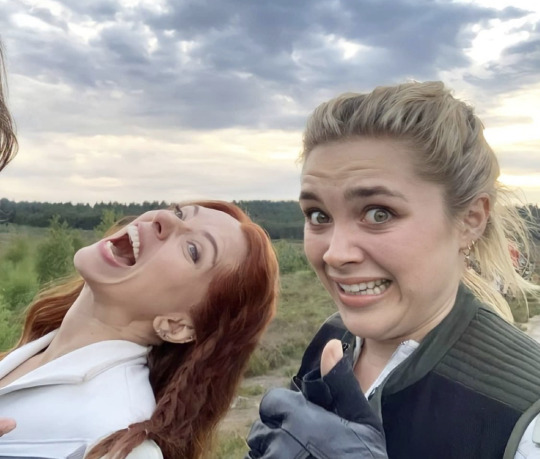
#RUSSIAN SISTER SUPREMACY#natasha romanov#yelena belova#scarlett johansson#florence pugh#black widow
50 notes
·
View notes
Note
i love ur moodboard and i hate what they did to Yulia in p2 literally one of the reasons i avoid p2 how could u change a design that perfect. the hair. the coat. the weird but distinct melancholic, pondering expression. cigarette always in hand. P1 yuila is so good
you KNOOOOW IT there are quite a few things from P2 Yulia that I like/consider canon across the board, namely that she has chronic leg pain and plays the cello (you know how i am with I instrumence. those who've read my burakhovsky fic know it well.) but to me her p1 design is. Literally genuinely unmatched. That's lesbian coding like that's what it IS + CANON LINES about loving women... they don't make them like these no more. I understand why she was changed, as the political/social climate towards homosexuality and depictions of it in Russia changed significantly in the past like. 5-10yrs. I understand it i do. But to me. P1 Yulia is THE Yulia. She's the moment. She's a star.
#again its already. huge and insane to me#to have had a TEXTUALLY + SUBTEXTUALLY + CODED + BASICALLY CANON lesbian character in a#2005! 2005!!! RUSSIAN INDIE VIDEO GAME!#even MODERN productions dont have the balls to do that.#anyways. p1 yulia supremacy. hill I'll die on.#as ive said i Know why they like. ''toned her down'' for a lack of better word.#some of my friends adore her p2 design because of her soviet scientist serve#and i love that for her. but to me. my short haired lanky andro lesbo yulia. like a sister to me.#ring ring (answers)#neigh (blabbers)#anonymous
18 notes
·
View notes
Note
I want to hear the entirety of your Sara analysis. I need to brainrot
Aaaaah…. I don’t exactly have a full on analysis planned out so this is gonna be just scattered thoughts.
First of all, we have never seen her straight up interact with Mr. Chidouin and the more we see of him and the more we learn about her, the more I’m becoming firmly set that Mr Chidouin is a villainous player. First of all, the fact a teenage girl, some dorky kid who loves cute uniforms and making stupid jokes, is somehow going into simulations for a game that is somehow meant to revolve around her and being a merciless killer, to the point the organization can’t control her…. To the point she’s high ranking over the adults, people like Qtaro…. And again, when there’s so many hints the game is made for her that she somehow has the perfect personality type for it…. Something is fucking up. Someone also mentioned in a post of mine that when in Kais emails it’s mentioned that Mr Chidouin wants to leave the house behind, Sara says she didn’t hear of any plans implying that was just testing Kai’s loyalty whether it was to Mr Chidouin or Sara. And with the implication that Meister wrote the memorandum that adds a whole new layer of uncomfortable! Basically, Sara is an abuse victim in this essay I will-
Okay but moving on, I also want to talk about the significance of not just Joe but everyone in the death games influence on Sara. Although Joe is the most important. It’s very significant that Sara doesn’t use the key on herself in the first trial. Because Joe is her best friend. Joe has already handicapped her, because of how much she cares that she’s willing to put her life on the line and her trust in him so he turns out alright. And…. As much as I hate to reference it, this scene is expanded upon in the manga. She thinks of taking the key at first but can’t because it’s Joe. Joe is her human anchor. Her bond with and grief for him also do a lot to push her towards other people (she was willing to pull her gun out on Alice but Joe wanted to trust him, Gins counciling for her grief, their talk with Mishima, etc) There’s also several other people who factor in to her ability to keep hold on herself who weren’t accounted for, and one person who she might not have been able to make a bond with if it weren’t for Joe.
Reko- So Reko was a very important person to Sara, but I don’t think this was the case in the simulations. The AI of Reko was 2 years behind, and didn’t have her current kind personality. Our Reko often encourages Sara, wants to take responsibility off of her, and cares for her like a big sister. That switch up in personality I think does a lot for Sara.
Nao- Nao is an ASTRONOMICAL factor in keeping Sara grounded. Nao in many cases is willing to bear the weight of Sara’s pain, such as by pushing the fake Reko for her, or in the massacre ending where she is willing to bear the burden of everyone’s deaths for her. I also want to point out a very important scene: the monitor room. When Sara says “I’ve really lost it haven’t I?” Nao takes Sara in close and says “You haven’t lost anything.” It’s important that when Sara feels shes slipping off the deep end she hears someone tell her she’s perfectly okay. God, they mean the world to me…
And now the big one….
Keiji- Honestly I have enough thoughts on Keiji and Sara for its own analysis so I’ll try and not go off on a tangent. Sara is initially suspicious of Keiji because why wouldn’t she be? He randomly comes up to her and tries to befriend her (my personal theory for this is that he was told to do this as his handicap) while giving no information about himself. While he does grow attached to her by the first main game (even breaking that emotionless facade by mistake) it takes her a while before she starts to trust him. But by chapter 31B the effect is significant. In logic route, Ranmaru saying his name is all it takes to bring her back to reality when she was about to go full murder mode. That is huge. Keiji is essentially Sara’s new Joe, further signified by later during the banquet when in a parallel to chapter 2, she imagines Keiji encouraging her to get through the game. I see a lot of people jeering that you can’t turn down signing the contract, but sorry ladies, Keiji is important to Sara. He has become to her another anchor.
And speaking of choices (smooth transitions? What are those?) I wanna talk about the lack of choice to go with Ranmaru in logic route. I will say I am dissapointed we don’t have an ending where we go with Ranmaru. It’d be so rad. But I do think the fact we don’t have that option says a lot about Sara’s character. When the Yabusame dies, her thoughts are “I didn’t want this.” And she then decides to make the resolve to become a better person. That means a lot. Sara has been changed by her experiences and her friends. She is not the same person from the simulations and it is not too late for her to change herself. And I just. (Chefs kiss) Mama Mia that’s a spicy character development, and I am now firmly logic route supremacy.
I also want to talk about her narrative and the weight of responsibility. After the Russian Roulette game, Kai tells her not to push herself, a sentiment that gets lost when she realizes he’s her stalker. The adults in the game all put her on a leadership pedestal when it shouldn’t be her responsibility. I used to think the biggest culprit of this was Keiji, but looking back and replaying the game, I think the biggest, albeit probably not malicious factor, was Qtaro. I made a post awhile back about how Keiji began to realize pretty early on that making Sara the leader was a mistake, and tried to calm her down. The thing is, by that point it was too late. By that point, she put the priority of the group over her best friend. Abandoning that responsibility would triple her guilt. Again, logic route seems to have her realization she isn’t fit to be leader, and Qtaros acknowledgement she doesn’t have to be one so, logic route supremacy.
This wasn’t really a full analysis but I hope I helped with your brain rot
80 notes
·
View notes
Text
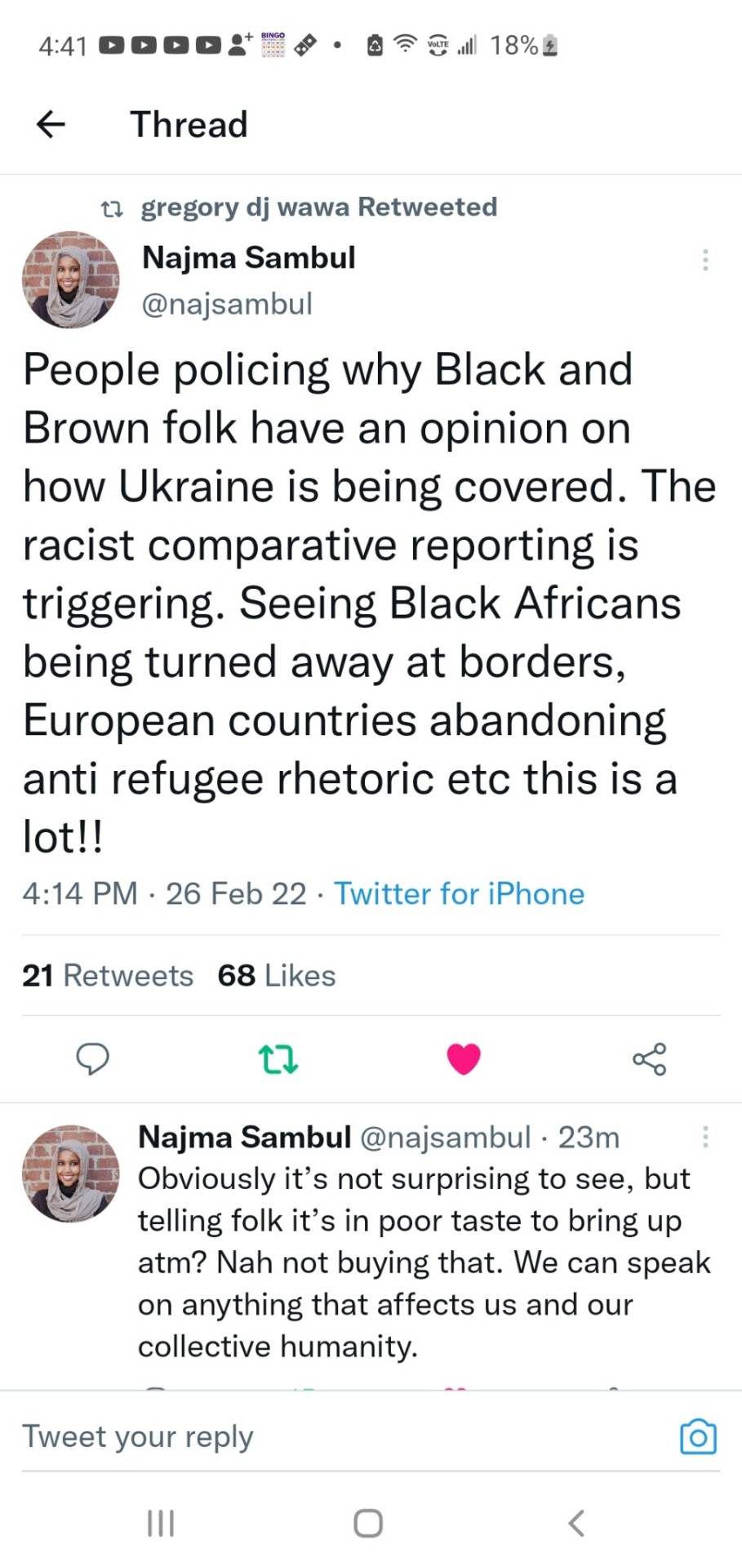
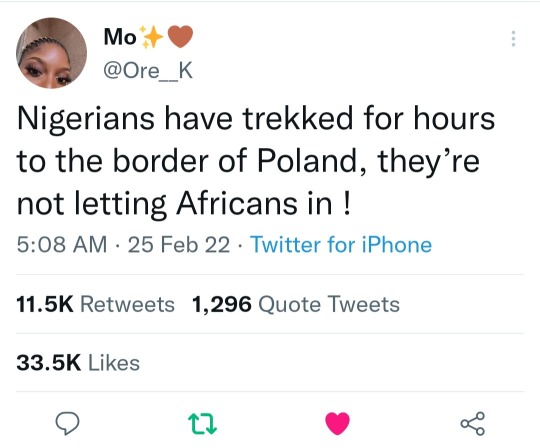
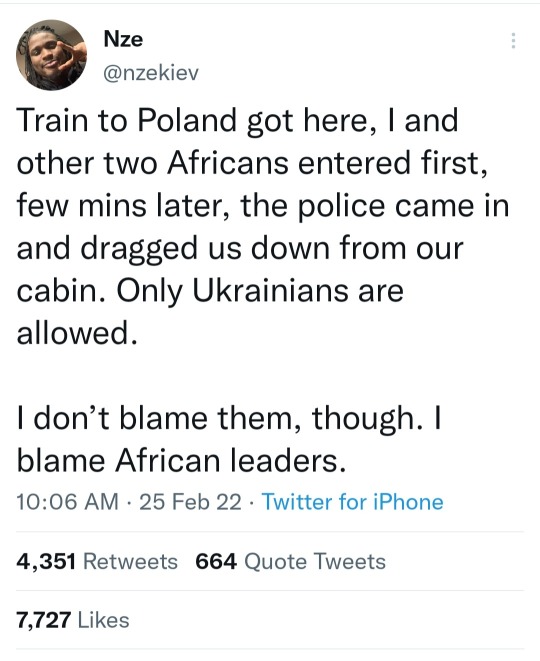
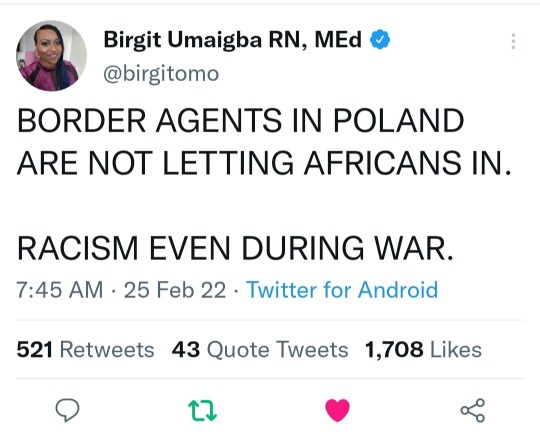

U.S. media doesn't see humanity in the Black and Brown victims of Western aggression.
But the Russia/Ukraine conflict, these white folks can see their family members, brothers, sisters, fathers, mothers, grandparents, and friends in those Russians and Ukrainians that they can't in Yemenis, Palestinians, Syrians, Libyans, and others....
The underlying issues is society is constantly tasked to seek humanity in white lives and none in black and brown ones.
This is a white on white conflict. This is not our fight. And never was. This is a white supremacy war between two racist countries. Not that I want anybody to get hurt or lose their life...but why? Should I care as a Black person...when we're facing hell everywhere...and can't even get a shred of sympathy. If any.
15 notes
·
View notes
Text
Slavic Names in Twilight | Meta
This post is going to be long, so if you don’t have time, I advise you to come back here later (or not come back at all, up to you).
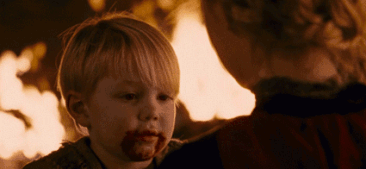
Honestly, I have no words for Smeyer anymore. I, probably like most of us, read the books while being an adolescent. When I was 12 I didn’t see a lot of things that happened to be in the books and were:
a) misogynistic
b) sexist
c) abusive
d) racist
and that the story itself was bound to Mormons (sick!).
If you want to read about it a little bit more I strongly recommend this post by @stregoni-benefici and @carlislesscarf
This post isn’t going to be about how Smeyer treated The Quileute Tribe, indigenous people, people of color or women. This post is going to be about how lazy Smeyer exactly was while creating this story and how her prejudices influenced and created false image of yet another culture.
Why am I making such a fuss because of this? A few days ago I was reading something about Garrett on Twilight Wiki page. By sheer luck, I clicked on Kate’s character and, what I saw there, outraged me to the point where I needed a little while to calm myself.
I was 12 when I first read the books. I never bought official twilight guide, I only used Twilight Wiki to keep myself up to date. I clicked on Kate’s character and saw that she hails from Slovakia. Forgive my utter confusion, when I remembered other sisters’ names. Tanya and Irina. Also, Kate was created by Sasha, who also created Vasilli (an immortal child), which is why she was executed in the first place.
While the story is charming, WHY THE FUCK DO THEY HAVE SUCH NAMES?!
To understand my rage, I need to elucidate the matter a little bit for all of you. This will be the historical part.
According to Twilight Wiki, Sasha was changed before 1000 AD. Then, she created Tanya, and not very long after, Kate and Irina. And now. What were the historical odds while it happened?
Before 1000 AD, Slovakia wasn’t Slovakia but Great Moravia. Great Moravia lasted about a century - the time span here is approximately circa 820 AD to 906 AD. When Great Moravia no longer existed, territory was taken by Hungarians (Magyar tribes also referred to as Hungarian clans) and the development of future Kingdom of Hungary began. Then, around 1000-1001, King Stephan was crowned as the first King of Hungary. Some elements from the former Great Moravia were acquired by The Kingdom of Hungary.
King Stephen managed to establish eight counties within his kingdom. Around 1015 some territories of today-Slovakia were acquired by Boleslav I of Poland (later king of Poland), however, King Stephen managed to recapture the territories in 1018. Wikipedia isn’t consistent here - while on History of Slovakia we have these information, the History of Poland during the Piast dynasty says:
From 1003 to 1004, Bolesław intervened militarily in Czech dynastic conflicts. After his forces were removed from Bohemia in 1018, Bolesław retained Moravia.
and:
[translation here is mine as the site is in Polish] Between 1003 and 1025/1031 the lands of today's Slovakia were part of the Kingdom of Poland after being conquered by Bolesław Chrobry. The Polish-Hungarian Chronicle described that "The Polish borders stretched as far as the banks of the Danube, to the town of Ostříhomia, then to the town of Eger, and further to the river called Ciepla [Topl'a] as far as the town of Salis, and there the borders between Hungarians, Ruthenians and Poles ended".
Than, probably around 1031 AD the territories were acquired back. King Stephen died and his kingdom fell into internal conflicts. Soon, in 1042 AD emperor Henry III mingled to acquire some lands for himself (he was the Holy Roman Emperor). Anyway, then came 1048 AD and that’s what happened:
In 1048, King Andrew I of Hungary conceded one-third of his kingdom (Tercia pars regni) in appanage to his brother, Duke Béla. [...] During the following 60 years, the Tercia pars regni were governed separately by members of the Árpád dynasty. [...] The dukes accepted the kings' supremacy, but some of them (Béla, Géza and Álmos) rebelled against the king in order to acquire the crown and allied themselves with the rulers of the neighbouring countries (e.g., the Holy Roman Empire, Bohemia).
The history of the Tercia pars regni ended in 1107, when King Coloman of Hungary occupied its territories taking advantage of the pilgrimage of Duke Álmos (his brother) to the Holy Land. Although, Duke Álmos, when returned to the kingdom, tried to reoccupy his former duchy with the military assistance of Henry V, Holy Roman Emperor, but he failed and was obliged to accept the status quo.
Source for the two quotes above.
You may ask, why on Earth did I just present to you part of history of Slovakia, Poland and Hungary. Because I want you to understand how completely ridiculous and simultaneously offending are the names of characters that Smeyer gave within this coven.
History shows us that, even though, these times weren’t exactly peaceful, there wasn’t an ongoing war. We have Hungarian tribes and the part, when some territories were acquired by a Polish king. What I mean by that, is that probably names around 1000 AD varied as to where your family lived, what was your social status, and probably were influenced by newly adopted Christianity. It is more likely that people on this lands were named with names of Hungarian origin than Russian. And I still think the majority of names were of Slavic origin, only with some local variations going on.
Now, a little bit of common knowledge. People who descend from Poland, Slovakia, Czech Republic and Hungary are best buddies for life, even if they never saw each other. We have mutual respect for these countries and for ourselves, as our history brought us together multiple times (bad times and good ones). Russia IS NOT a part of this “mutual respect pact”. Mostly due to events that happened during both World Wars (i.e. Katyń Massacre), as well as other ones (Partitions of Poland, Eastern Bloc - communism).
Most of the names used by Smeyer are of Russian (or Greek, or Hebrew) origin. Not Slavic origin. And while Russia is also the part of Slavic languages, there’s a significant distinction between West Slavic Languages (Slovakian, Czech, Polish language), East Slavic Languages (Belarusian, Russian, Ukainian) and South Slavic Languages (i.e. Serbian, Croatian, Bulgarian).
It makes difference to the point that if I go to Slovakia or Czech Republic I'm able to communicate with people in my native language (Polish) while they can answer me in their native language. Not everything is going to be the same but you're able to maintain a conversation mostly about every topic that you'd like to discuss. It isn't impossible to do so with Russian or Ukrainian but it's much harder and there are more differences, and sometimes you aren’t able to communicate this way. The same goes with i.e. Croatian or Bulgarian.
Don’t get me wrong, dear friends from Russia (if anyone from Russia will ever read this). I’m pissed off because even though Smeyer created not one, but four characters with SLOVAKIAN origin, she didn't use at least one name which fully originated in that territories (and probably was used) around 1000 AD. She went for Russian names because, sure, let's do that, there's no big difference anyway and it’s easier. To add to that, Smeyer used Russian names which are widely used NOWADAYS, not ones which were probably popular (or just used) thousand years ago.
Now, quick briefing on very popular names from that time (c. 1000 AD) in Slovakia and Czech Republic.
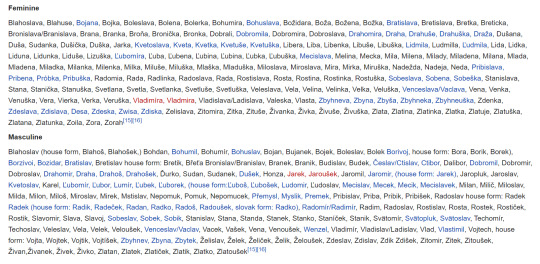
Here’s the full article on Slavic names.
While some of these names are used today, some of them aren’t at all or are used in a different, more evolved form.
Now, to the names of our characters. The most explainable and justified name here is Kate’s name. In Twilight Wiki we can find that her actual name was Katrina and that her preferable name now is Kate. Let’s see the origins of the name Kate.
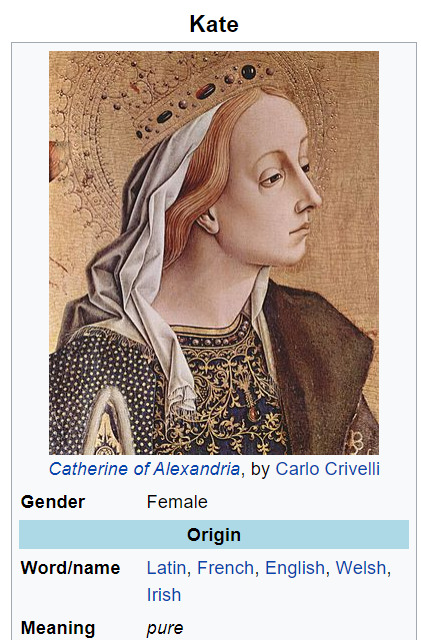
Full article here.
While we can read that variations of that name in Czech are: “ Katka, Kateřina, Kačka, Káťa, Kačenka, Káča, Kačí, Kačena” and in Slovakian “Katka, Katarína” still the origins aren’t Slavic.
Next, Irina.
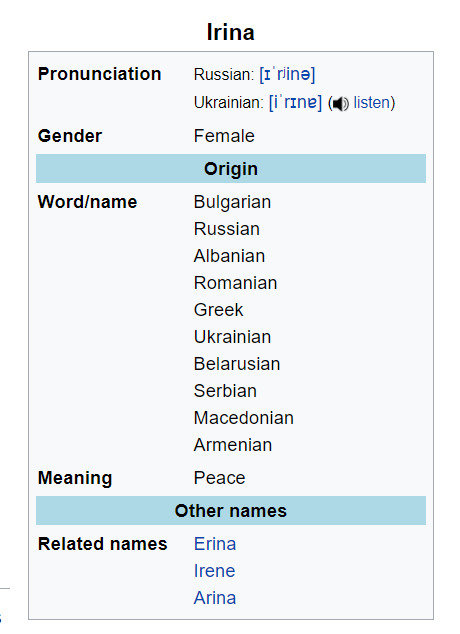
As Wikipedia says:
Irina is a feminine given name of Ancient Greek origin, commonly borne by followers of the Eastern Orthodox Church. It is derived from Eirene (Ancient Greek: Εἰρήνη), an ancient Greek goddess, personification of peace.
Diminutive forms in Slavic languages include Ira, Irinka, Irinushka, Irisha, Irka, Irochka, Irinochka.
Here, we also don’t have Slavic origin. While it’s better than with Kate’s name because origins here seem to hugely blend, the proper origin of Irina’s name is Ancient Greek. I will never believe that a peasant girl from around 1000 AD was named Irina.
Here’s the full article.
Next, Vasilli.
Wikipedia doesn’t say much, except it’s a RUSSIAN NAME with Greek origin.

Full article here.
Now, finally, we’ve two names left. First, Sasha.
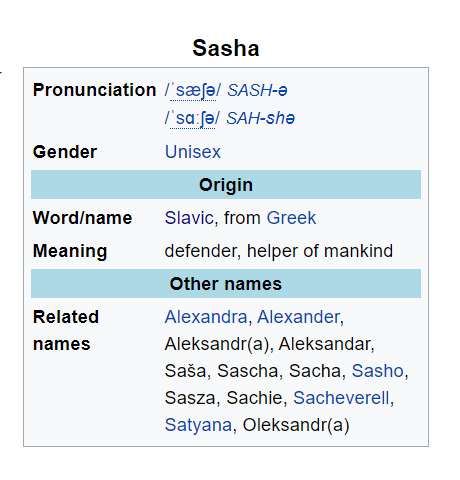
Finally, first one, which has Slavic origin. And while this name has many variations in many languages, I don’t believe that anyone in Slovakia prior to 1000 AD would name their child Sasha. This name gained popularity in 1970s, and I believe that it would be used rather as diminutive of a name in 1000 AD than a name itself.
Full article here.
Last, but not least, Tanya.
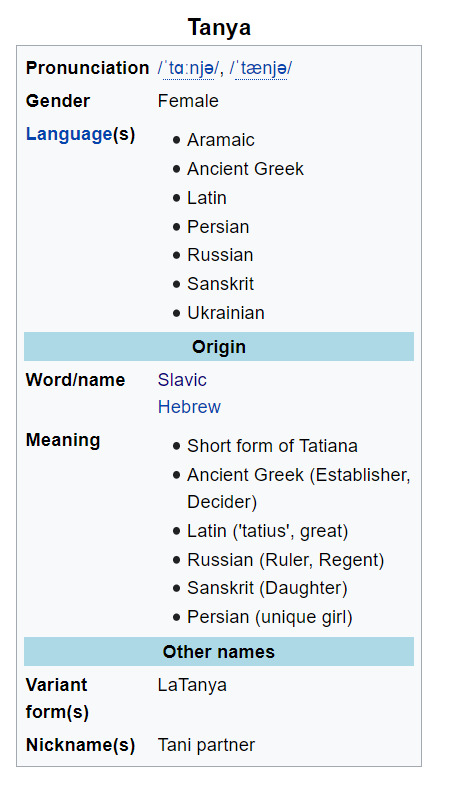
Here, also, it isn’t a full name. Full name is Tatiana, and Tanya, especially in Slavic it is used as a nickname implying intimacy with the person OR used for baby talk.
Full article here.
What’s my point here? Even though two of these five names are partially Slavic in origin, they sound like Russian names. Not Eastern Slavic in one fucking bit. Sure, Smeyer could do a simplification and say that, yeah, girls acquired other names as centuries passed. Agreed, even strongly.
BUT
Smeyer never said anything like this. Also, I’m under the impression that this names were meant to sound Russian. And, people, don’t get me wrong, I really hold nothing against Russians, but because of doing such thing Smeyer has perpetuated certain patterns and beliefs that have become firmly established in US culture and West culture in general by now.
No wonder why some people never distinguish between Russia, Slovakia, Poland, Czech Republic or Ukraine, or other countries from Easter Bloc. How can they, where in majority of mass media they’re taught that IT IS EXACTLY THE SAME THING. Why should they bother?
I have many friends among Slovakian people. Slovakia is like a second home to me. I also have a few friends from Czech Republic. And before, I’ve never been bothered by this name thing because I was a child. Today I couldn’t be silent about it.
It’s sad that another culture and fantastic history was just blended in with Russia because why not. I don’t understand why in Western movies or books all people from former Eastern Bloc need to be Russian.
I am Polish and to me it’s just extremely sad. We (and I think I can count in here Slovakia, Czech Republic, Hungary, but also Croatia or Serbia) have fantastic culture and very long, eventful history. People from these countries are welcoming and share great hospitality.
I don’t know why Smeyer did something like this, but I suppose it’s just a thing she does to everyone. Rip away their culture and pretend she didn’t do it.
I am grateful that this fandom is a lot wiser than the creator of the books. This is what I said in the beginning of this post. Smeyer could’ve gone to library and read a little about the history and the names. I mean, If she didn’t found it on the Internet, because it was 2006, I believe, so she could research it. If there was nothing on the Internet, I’m sure a library would do.
She did a poor research or didn’t do it at all. And that’s what happened. Was it worth it? I don’t think so.
***
Everyone, please, comment, but be kind to each other (and to me xd). I wrote what I felt. As I’ve told you already, I’m Polish and I really felt that I should write this meta/disclaimer from a point of view of a person who lives in Slavic-origined country and has many Slavic-origined friends.
I still feel triggered because of this. Reblog this so others could see and say what they think.
#twilight meta#slavic culture#polish culture#history#cultural and historical references in twilight#smeyer being an ignorant discourse#smeyer nonsense#this woman is bound to white supermacy#Slavic names#Polish & Slovakian historical background#twilight revival#the twilight saga#smeyer cannot use library properly#neither can she use internet#slovakian culture#why the fuck should you confuse Slovakian people with Russian people?#Hungary mentioned#twilight#twilight saga
121 notes
·
View notes
Note
Keeping my fingers crossed for that Black Widow meta
Aha, okay. As usual, I am ludicrously easy to enable, so let's take a crack at this. The ask obviously contains SPOILERS for the Black Widow film (and is also tagged "black widow spoilers" if you're planning to filter), and discussion/reference to other films/properties in the MCU, though I don't feel like any of those are still a secret.
Anyway, as I said in my earlier post, I can't believe I am actually still trying to critically analyse a Marvel production in the year of our Lord 2021, but then, I feel like we all have a complicated relationship with it. Likewise, the feeling of "oh wow NOW you're giving Natasha a solo movie after you killed her off in a cheap and fairly sexist way in Endgame?" If this film had come out ten or even five years ago, it would have been major, but holding it off until now seems to have left most of us justifiably unimpressed. Plus, as I am absolutely not the first person to point out, it renders Natasha's sacrifice in Endgame "because I don't have a family" even more narratively incoherent. I realize that this film was written after that one by totally different people, there's no point in expecting the MCU to make consistent canonical sense throughout its eighty billion different films/series, we were all stuck with a mess after the Whedonified Age of Ultron Nat, and so forth, but still. Natasha explicitly SAYS that she has two families (her wacky Russian found family of spies and the Avengers) and her decision to leap off the cliff in Endgame to save Clint and his retconned perfect white heterosexual nuclear family.... Hmmmm. To which I say to you, I do not bite my thumb at you, sir, but I do bite my thumb at Male Writers, sir.
Likewise, while I am wildly attracted to Florence Pugh as Yelena and deeply desire to be wrapped between her thighs, the movie felt more like her story than Nat's. Yelena drove most of the plot and the action, while Nat was just kind of along for the ride. As a solo piece, we really didn't learn that much about Natasha aside from the opening scene (which felt like it was straight out of The Americans and probably worked the best of the whole film for the reason) with her childhood in America. But even the infamous "what happened in Budapest" backstory with her and Clint was quickly info-dumped rather than shown, and they could have taken more narrative risks or included more flashbacks or otherwise given us more NATASHA, y'know??? Instead of cramming the film into the small space between Civil War and Infinity War and making it even weirder that Nat seemingly has no memory or reference to these events when she returns to the team at that time. Why not show her looking for Yelena or her actual defection to the Avengers or anything else we might want from a film that purportedly exists entirely to provide backstory for a now-dead character? It felt like even in the film universe, the main quest was being repeated -- she tried to kill Baddie McSoviet once before and it didn't work out, so she has to do it again, something something. Okay.
As for that, good ol' Marvel and its American Superiority TM. The only actual Eastern European actress in this film about Eastern Europeans was Antonia/Taskmaster, played by the Ukrainian Olga Kurylenko (and I was very interested in her?? If she's supposed to be a narrative foil and a ghost of Nat's past and mark of her former sins, etc., why not develop her as an actual character?) Everyone else were Brits and Americans hamming it up with even more chew-the-scenery fake Russian accents than Elizabeth Olsen's "Sokovian" accent as Scarlet Witch. If it's established that they all have perfect American accents at the start of the movie, why is Nat the only American-accented character in the modern day if she had presumably the exact same childhood as Yelena? I know it's another way to set her apart, but that and Baddie McSoviet (the Russians are finding a way to steal free will from people's brains! Zomgz!!! Is this 2021 or 1981?) were straight out of the Cold War in terms of its not-so-veiled American Supremacy Message. Likewise, making modern!Natasha a former KGB agent never really made sense, since she says in Winter Soldier that she was born in 1984, and we see her in this film as an 11-year-old in 1995. But the USSR collapsed in 1991, when she was seven, and the Red Room appears to be an entirely unrelated flying....lab....thingy run by a generic evil Russian (Ray Winstone, likewise Hamming Up Accent). So like. What is she, guys?? Make up your minds!!!
Likewise, Baddie McSoviet/Dreykov as a villain obviously plays into the hoary old Hollywood "All Bad People Are Recognizable As Being Terrible Sexists and Also Probably Russians" trope, but aside from that, he doesn't make sense. He has this entire army of basically unstoppable Widows and he has just been.... waiting around and causing random explosions? Or was just waiting for Nat and company to return so he could Put His Evil Plan Into Motion? Are we really supposed to believe that this guy has just been sitting up in his flying saucer and essentially never doing anything this whole time? He had about a million chances to launch this take-over-the-world plan long before Natasha ever got there. Plus, I.... am.... not sure what to think (aside from /deep sigh/ MARVEL) about the fact that all the Widows we see dying/getting killed on screen are women of color. (Then the Black surgeon who was about to remove Yelena's brain in the Red Room and the only other Black guy being Natasha's errand boy, which just... in context... YIKES.) I think the fact that there are random Black background Widows are supposed to mean that they're inclusive and badass or something? Scarlett Johansson also has her own issues with White Feminism and all the other things we've critiqued her for before, so after TFATWS and the Flag Smashers, Marvel clearly has found its subtly racist sweet spot. As usual?
The end of the film also just basically turns into the standard Marvel empty-spectacle/cool-looking fights/people flying through the air thing, and I wanted a lot more focus on the wacky found-family Russian-spy hijinks (I did love them, for reasons) and character dynamics, rather than all of them separately fighting baddies in different places. I did obviously have feelings about Natasha putting the parachute on Yelena to save her life. But why were we then denied Nat/Gamora parallels/relationships/any character development or interaction at all in Infinity War/Endgame? Both of them are trained assassins adopted into a non-biological family that they have a complicated relationship with, but end up forging a strong bond with their sister (Yelena/Nebula) nonetheless. Of course, that would have required Endgame to put more effort into its female characters than what it did, which was one (1) Epic CGI Charge Scene at the very end, and literally nothing else. Not that I am still salty about this or anything.
Anyway. The movie was genuinely fun in places. The wacky Russian found family of spies was definitely the best part, even if it made Endgame even more nonsensical as a result. But I wanted this movie to be a lot better than it was overall, though I probably would have liked it more if it had actually come out in a timely fashion and wasn't only released after they killed her off. It just feels like there were so many possible threads of potential that could have been done with Natasha if they were actually interested in experimenting and exploring the character and not just coming up with new baddies and ways to go boom, and it unfortunately missed the mark with that.
31 notes
·
View notes
Text
Mj’s Ultimate Political Reading List (that isn’t just crusty russian dudes)
Hello! Today I’m going to give you a list of books that I recommend that revolve around leftist politics!
Malcolm X Speaks by Malcolm X
Women, Culture, and Politics by Angela Davis
Women, Race, & Class by Angela Davis
Freedom is a Constant Struggle by Angela Davis
The Meaning of Freedom by Angela Davis
Abolition Democracy by Angela Davis
Are Prisons Obsolete? by Angela Davis
The Prison Industrial Complex by Angela Davis
Sister Outsider by Audre Lorde
Gender Trouble by Judith Butler
Performative Acts and Gender Constitution by Judith Butler
Imitation and Gender Insubordination by Judith Butler
Bodies That Matter by Judith Butler
Excitable Speech by Judith Butler
Undoing Gender by Judith Butler
The Souls Of Black Folk by W.E.B. Du Bois
Black Reconstruction In America by W.E.B. Du Bois
Darkwater by W.E.B. Du Bois
This Bridge Called My Back by Cherríe Moraga
Ain’t I A Woman? by Bell Hooks
Communist Manifesto by Karl Marx
Socialism: Utopian and Scientific by Fredrich Engles
Fascism: What is it and How to Fight it by Leon Trotsky
Profit over People by Noam Chomsky
The Accumulation of Capital by Rosa Luxemborg
Reform or Revolution by Rosa Luxemburg
The Conquest of Bread by Peter Kropotkin
Discipline and Punish by Michel Foucault
Black Skins, White Masks and The Wretched of the Earth by Frantz Fanon
Orientalism by Edward Said
An Introduction to Marxist Economic Theory by Ernest Mandel
The Affluent Society by John Kenneth Galbraith
The Second Sex by Simone de Beauvoir
Anarchism and Other Essays by Emma Goldman
Go Tell It On The Mountain by James Baldwin
Black Women, Writing, And Identity by Carole Boyce Davies
Feminism Without Borders: Decolonizing Theory, Practicing Solidarity by Chandra Talpade Mohanty
An End To The Neglect Of The Problems Of The Negro Women by Claudia Jones
Left of Karl Marx: The Political Life Of Black Communist Claudia Jones by Carole Boyce Davies
The Postmodern Condition by Jean François Lyotard
Capitalist Realism by Mark Fisher
Colonize This! by Daisy Hernandez and Bushra Rehman
Socialism Made Easy by James Connolly
Bad Feminist by Roxanne Gay
The New Jim Crow: Mass Incarceration in the Age of Colorblindness by Michelle Alexander
The Sacred Hoop by Paula Gunn Allen
Black Feminist Thought by Patricia Hill Collins
Eloquent Rage: A Black Feminist Discovers Her Superpower by Dr. Brittney Cooper
Heavy: An American Memoir by Kiese Laymon
How To Be An Antiracist by Dr. Ibram X. Kendi
I Know Why the Caged Bird Sings by Maya Angelou
Me and White Supremacy by Layla F. Saad
So You Want to Talk About Race by Ijeoma Oluo
Notes Of A Native Son by James Baldwin
Biased: Uncover in the Hidden Prejudice That Shapes What We See, Think, and Do
Stamped from the Beginning: The Definitive History of Racist Ideas in America
The Color of Law: The Forgotten History of How Our Government Segregated America
A Vindication of the Rights of Women by Mary Wollstonecraft
The Socialist Reconstruction of Society by Daniel De Leon
7 Feminist And Gender Theories
The Second Founding: How the Civil War and Reconstruction Remade the Constitution
Invisible No More: Police Violence Against Black Women and Women of Color by Andrea J. Ritchie
Just Mercy by Bryan Stevenson
Lavender and Red by Emily K. Hobson
Raising Our Hands by Jenna Arnold
Redefining Realness by Janet Mock
The Bluest Eye by Toni Morrison
The Fire Next Time by James Baldwin
The Next American Revolution: Sustainable Activism for the Twenty-First Century by Grace Lee Boggs
The Warmth of Other Suns by Isabel Wilkerson
Their Eyes Were Watching God by Zora Neale Hurston
When Affirmative Action Was White: An Untold History of Racial Inequality in Twentieth-Century America by Ira Katznelson
Whistling Vivaldi: How Stereotypes Affects Us and What We Can Do
The Common Wind by Julius S. Scott
The End Of Policing by Alex S Vitale
Class, Race, and Marxism by David R. Roediger
Yearning by Bell Hooks
Race, Gender, And Class by Margaret L Anderson
Ezili’s Mirrors: Imagining Black Queer Genders by Omise’eke Natasha Tinsley
Working At The Intersections: A Black Feminist Disability Framework” by Moya Bailey
Theory by Dionne Brand
Dora Santana's Work by Dora Santana
Property by Karl Marx
Wages, Price, and Profit by Karl Marx
Wage-Labor and Capital by Karl Marx
Capital Volume I by Karl Marx
The 1844 Manuscripts by Karl Marx
Synopsis of Capital by Fredrich Engels
The Principals of Communism by Fredrich Engles
Imperialism, The Highest Stage Of Capitalism by Vladmir Lenin
The State And Revolution by Vladmir Lenin
The Revolution Betrayed by Leon Trotsky
On Anarchism by Noam Chomsky
#reading list#leftist#leftism#black leftists#queer leftists#leftist reading list#communism#marxism#socialism#anarchism#communist#marxist#anarchist#socialist#politics#political theory#social justice
85 notes
·
View notes
Text
Biopreparat - Chapter 2 : Durak
18th August 1991. Special KGB agent Leonid Kennedimsov is spending his days off with his friend and family. But a putsch is in preparation.
Second chapter of the RE4xRE8 crossover. In this chapter, meet Leonid Kennedimsov, the cheap soviet counterpart of Leon Kennedy ; a chain smoker and addicted gambler who try to keep ties with his family.
Also included in this chapter :
-A popular Russian card game,
-Leonid trying (but failing) to be as cool as Leon,
-A chase in Moscow in the middle of a putsch,
-A TF2 reference,
-Some silly and overcomplicated investigations of the KGB on Mother Miranda’s cult. Lady Dimitrescu has a crapton of money!
-A cameo of Boris Yeltsin,
-Idiotic Dimitrescu sisters arguing over pop culture
AO3 link below :
https://archiveofourown.org/works/35665660/chapters/89476483
Enjoy the read!

Leonid Kennedimsov after too much vodka.

Armored vehicles in Moscow during the coup, 19th August 1991

Avoid Muscovite tunnels during rush hour! (Source : The Bourne Supremacy - 2004)

Whattya gonna do when they come for you?

The Lada Samara ; the faithful steed of the 1980s Soviet working class...

Yeltsin, too, likes Vodka, but in the morning. Right before a talk about bioweapons with Leonid and a historical speech on a tank in front of the Soviet Parliament.

Don’t mess up with rich vampires! (Source : Les Inconnus - Rap-tout - 1990)
3 notes
·
View notes
Text
I was looking at books on Marxism + Feminism online and came across the book:
Marxism and the Oppression of Women: Toward a Unitary Theory
A woman named Susan Rosenthal wrote this 3-star review. I just skimmed it and wanted to share here to see people’s thoughts. I have not read the book myself but I am curious about this review.
“Takes us down the wrong road”
Reviewed in the United States on March 15, 2014
Can marxism guide us in our struggle against women's oppression? In her preface to "Marxism and the Oppression of Women: Toward a Unitary Theory," Lise Vogel acknowledges the value of marxist theory:
"I remain convinced that the revival of Marxist theory, not the construction of some socialist-feminist synthesis, offers the best chance to provide theoretical guidance in the coming battles for the liberation of women". (p.ix)
At the same time, she argues,
"...that the socialist tradition is deeply flawed, that it has never adequately addressed the question of women..." (p.2)
These two statements reveal the strength and weakness of Vogel's book.
The book's strength lies in its marxist analysis of the labor necessary to reproduce the working class, the portion of that labor performed by women in the home, and the role of men in the sexual division of labor.
The book's weakness lies in its description of how capitalism organizes reproduction as a "system of male domination." With this description, Vogel retains the core of capitalist (bourgeois) feminism, that the liberation of women requires a cross-class women's movement organized separately from men.
Ferguson and McNally's 24-page Introduction supports Vogel's concept of a "male-dominant gender-order."
"It is not biology per se that dictates women's oppression; but rather, capital's dependence upon biological processes specific to women - pregnancy, childbirth, lactation - to secure the reproduction of the working class. It is this that induces capital and its state to control and regulate female reproduction and which impels them to reinforce a male-dominant gender-order. And this social fact, connected to biological difference, comprises the foundation upon which women's oppression is organized in capitalist society." (p. xxix)
Dishonest
To support her position, Vogel refers to the writings of 19th and early 20th century socialists. She quotes August Bebel, "women should expect as little help from the men as working men do from the capitalist class," and Eleanor Marx and Edward Aveling in The Woman Question,
"Women are the creatures of an organized tyranny of men, as the workers are the creatures of an organized tyranny of idlers." (p. 108)
She concludes that "the idea that women's situation parallels that of workers suggests a strategy of parallel social struggles for freedom" (p. 108).
This entire section is dishonest. Vogel ignores Bebel's description of upper-and-middle-class women and working-class women as "enemy sisters," and his explicit recommendation against women in antagonistic classes organizing together, except for united-front actions that benefit all women.(1)
Vogel also disregards Eleanor Marx, who could not be more clear on the matter:
"For us there is no more a `women's question' from the bourgeois standpoint than there is a men's question. Where the bourgeois women demand rights that are of help to us too, we will fight together with them, just as the men of our class did not reject the right to vote because it came from the bourgeois class. We too will not reject any benefit, gained by the bourgeois women in their own interests, which they provide us willingly or unwillingly. We accept these benefits as weapons, weapons that enable us to fight better on the side of our working-class brothers. We are not women arrayed in struggle against men but workers who are in struggle against the exploiters."(2)
In other words, socialists do not counter-pose women's liberation to the needs of the revolution; we use women's liberation to achieve the revolution.
Class matters
Vogel describes, but does not seem to understand, Clara Zetkin's class-based approach to women's liberation which is that all women are oppressed, but not all women have the same interest in ending capitalism. Women in the capitalist class are denied "free and independent control over their property," a condition that can be remedied by legal equality under capitalism.
In the middle and professional classes, women strive for equal access to education and employment compared with the men of their class. They call on capitalism to fulfill its pledge to promote free competition in every arena, including between women and men. These women form what is commonly called the `bourgeois' women's movement because they limit their demands to legal reforms.
Working-class women also seek legal equality with the men of their class, but such equality would only mean the right to equal exploitation. The liberation of working-class women requires an end to labor exploitation, and that can be achieved only by uniting with working-class men.
Theoretically and practically, the question of women's liberation peaks during the Russian Revolution. Vogel describes Lenin's emphasis on the importance of freeing women from "domestic slavery" so they could participate fully in the revolutionary transformation of Russian society. Achieving this required a two-fold process: socializing domestic labor and engaging men in housework. The latter required a systematic campaign against male chauvinism. Could such a campaign succeed?
Vogel observes that the capitalist system pays men more so they can support child-bearing women in individual family units. She concludes that this creates a system of male domination, or patriarchy. She writes,
"a material basis for male supremacy is constituted within the proletarian household... [providing] a continuing foundation for male supremacy in the working-class family." (p.88)
Vogel neglects to mention that the higher male wage comes with a price. `Family obligations' tie men to jobs they might otherwise leave. Men are legally bound to support women and children, even after they have left their families and formed new ones. And "dead-beat dads" can be imprisoned for not paying child support.
The key question is whether putting men in a financially-dominant position requires them to personally dominate their homes. The one does not automatically follow from the other. A superior financial position does not create male domination in the family, it only creates the opportunity for it.
Individual men can choose what to believe and how to treat others. Some men take advantage of their financial position to dominate women and children. Others do not. Consequently, the sexual division of labor under capitalism does not qualify as a system of male domination over women that can be compared to the system of capitalist domination over workers. The antagonism between women and men can be eliminated by re-organizing society. The antagonism between capital and labor is irreconcilable. As long as capital exists, labor will be exploited.
A system of sexism
Some socialists argue that "the current use of the term patriarchy...merely describes a system of sexism."(3) We certainly do suffer a system of sexism; every woman can testify to that. However, patriarchy implies a system of domination by men, while a system of sexism implies that society is dominated by sexist ideology. The difference is important.
A system of male domination implies that all men benefit from the oppression of women, whether they choose this or not. A system of sexist ideology allows individual men (and individual women) to choose whether to adopt or reject sexist beliefs and behaviors.
The failure to distinguish between individual interests and class interests lies at the heart of the debate over whether men benefit from women's oppression and whether women should organize separately from men.
The working class can never achieve socialism unless most women fight for it. Therefore, as a class, working-class men cannot benefit from women's oppression. However, the system of sexist ideas gives individual men the opportunity to do so. Some men embrace this opportunity; other men reject it.
Capitalism pressures all workers to abandon their class interests for the promise of personal gain. White workers can take advantage of Black oppression to advance themselves, or they can choose to fight racism. Individual workers can accept management bribes to get ahead, or they can choose to join a union, and so on.
Male superiority is the booby prize that capitalism offers men to sweeten the bitter taste of class exploitation. As Vogel notes,
"The ruling class, in order to stabilize the reproduction of labor power as well as to keep the amount of necessary labor at acceptable levels, encourages male supremacy within the exploited class. "(p.153)
While capitalism "encourages male supremacy," many men reject this role because it hurts the women they love, and it blocks them from enjoying egalitarian, cooperative relationships.
The individual man has no choice about whether or not the women in his life are oppressed; capitalism ensures that they are. However, individual men can choose either to take advantage of women's oppression or to share the burdens of the home and join the fight to socialize domestic labor.
Class comes first
The socialist challenge is to convince working-class men to put their class interests first, to convince them that whatever benefits they gain from women's oppression pale in comparison with the benefits they could have by rejecting sexism and fighting alongside women to end capitalism and all of its oppressions.
In contrast, Vogel, Ferguson and McNally offer a pseudo-marxist argument for a cross-class movement of women organized separately from men. This concession to bourgeois feminism betrays the interests of working-class women.
Any mixed-class movement of women must betray its working-class members. When working-class women demand socialized childcare, their privileged sisters moan about paying higher taxes. When working-class women demand more pay, their privileged sisters oppose the rising cost of hired help. The only `feminism' that can liberate all classes of women is the `feminism' that is based on the goals of the working class.
As Lenin argued with the Jewish Bund, advocating the right of oppressed groups to organize independently is different from promoting independent organization on principle. As a tactic, independent organization can advance the struggle against oppression within the working-class. As a principle, the independent organization of women deepens antagonisms between men and women and undermines working-class unity.
If the goal of this book was "to provide theoretical guidance in the coming battles for the liberation of women," then it takes us down the wrong road. To argue that women must organize separately from men is pessimistic and self-defeating. As Vogel documents, both women's oppression and men's role in this oppression are rooted in capitalism. Therefore, only a united working-class fight can uproot it.
There is nothing flawed or lacking in the socialist tradition of women's liberation; it simply does not meet the needs of privileged women who seek to end their own oppression without destroying the class system that enslaves their working-class sisters.
The value of Vogel's book lies in her confirmation that the sexual division of labor, male-female relations, and existing family structures are not based on biology but on the particular historical form that capitalism has chosen in order to ensure the reproduction of the working class. While not original, this hopeful message is worth repeating:
No biological barriers prevent women and men from working together to reshape the world to meet their needs. Only capitalism stands in the way.
Notes
1. Cited in Draper, H. (2011). Women and Class: Towards a Socialist Feminism. Center for Socialist History, pp.234-5.
2. Cited in Draper, H. (2011). Women and Class: Towards a Socialist Feminism. Center for Socialist History, pp.287.
3. Marxism, feminism and women's liberation, Sharon Smith, Socialist Worker, January 31, 2013.
2 notes
·
View notes
Text
End Of The Year Faves 2020!
Rules: it’s time to love yourselves! choose your 8 (ish) favorite works you created in the past year (fics, art, edits, etc.) and link them below to reflect on the amazing things you brought into the world in 2020. tag as many writers/artists/etc. as you want (fan or original) so we can spread the love and link each other to awesome work!
I was tagged by @moonlit-imagines and @myriadimagines thank you!!! I was really excited to talk about some of my favorite fics, I just didn’t have a chance to compile them hahaha until now
1. Finally Okay (Wanda Maximoff x reader) part 1, part 2, part 3
This was 100% my favorite thing I wrote this year, originally for a writing challenge by @moonlit-imagines. It combines all of my favorite things, soft!Wanda, the angst, the drama, mysterious powers, and an Agents of SHIELD cameo. I had so much fun writing the first part that I wrote a second and a third to complete it, and I was also encouraged by the really nice comments that you all left! I put a lot of time and effort into this mini-series and I’m really happy with how it turned out.
2. My Marvel OC, @aka-willow!
This was more of a series of stories, and something I’m editing right now to a little more of a polished story, so keep an eye on that blog if you’re interested in that, or check out the link to her profile. I love writing for Willow as a Marvel character, she’s super fun, chaotic, and there’s always a ton of angst because that’s how we roll. Part of what I like about her is exploring the day-to-day life of heroes and people in the MCU, while also dealing with some of the more notable events and foes.
3. Having a late night movie night with Wanda Maximoff (Wanda Maximoff x reader)
I wrote this as a birthday present for Lacey and my thought process behind this was to write something as soft as possible because 1) @moonlit-imagines deserves so much and 2) again, soft!Wanda supremacy here
4. Being Natasha’s sister and a masterspy and her not knowing about your existence until you get in her way (Natasha Romanoff x reader)
I think this was one of my first posts ever on this blog, and I remember writing this at work before the pandemic hahaha, killing time while on call at the office for the evening
5. Being an Inhuman and SHIELD tracking you down when you’re unable to control your powers (Agents of SHIELD x reader)
This was my first Agents of SHIELD imagine I wrote and this is like... I love this trope? I just wrote about this the other day, but like the “person’s secret identity/powers is discovered” is one of my favorite tropes, and that combined with one of my favorite sets of characters made this like 🥺
6. Being Bella Lestrange’s daughter and friends with the Golden Trio (Golden Trio x reader)
I wrote so many headcanons for this request, and it later ended up inspiring one of my OCs here! It was such an interesting dynamic to explore, and I ended up going way overboard and covering like all 7 books
7. Natasha getting so mad at you that she starts yelling in Russian and you finding it hot (Natasha Romanoff x reader)
I was absolutely overwhelmed with the love that this post got and it was a blast to write, mostly because I am reader and reader is me in this imagine. Like the entire time I was reading the request and writing it, I was like “okay me”
8. Dating Lila Pitts (Lila Pitts x reader)
I wrote this immediately after finishing Umbrella Academy season 2 and had SO MUCH FUN with these. Also I’m in love with her
5 notes
·
View notes
Text
WATCHMEN PILOT
Okay... more spoilery impressions. I mentioned in my tags that I really didn’t like the Zach Snyder filmed version of WATCHMEN. The biggest reason is that it wallowed in the very same glossy veneer of super-heroes on film (the slo-mo fights, the over-indulgent set-pieces) that WATCHMEN made a point of dismantling.
It also didn’t have the comicbook print primary color cynicism of WATCHMEN. I felt drained and sad after reading that book for the right reasons.
WATCHMEN the movie, just felt like yet another superhero movie, that was trying to be “edgy” in a very shallow way.
THIS however, does carry the same mood as the source material and big BONUS for continuing the story from the comic book ending, instead of the movie ending...
That’s what the raining “squids” were about, BTW.
That alluded to the world still seeing after-effects of Veidt’s Apocalyptic monster.
And super-clever usage of Rorschach, this hyper-violent, mentally ill white man, who was physically small and unremarkable, but whose dark way of seeing the world, would believably be warped to be the mascot for white supremacists view of the other.
Also, ALSO....
LOVE that this modern alt-universe made the cops the targets of white supremacy instead of it’s mainstream tool.
OMG!!! Tulsa...
The opening was as harrowing and heart-wrenching as it was disgusting, as it should be. I also noticed that the opening black couple had a darker-skinned woman than her husband, which is rare in media. Typically the woman is lighter in skintone than her romantic partner.
The segue into the hip-hop track, being played on the radio by a member of the Kalvary (*whew!*) reminded me of Underground and just made me miss that show all over again.
There is a sense of impending doom throughout this pilot. You can just feel that the other shoe will drop, and drop it did.
Regina King as Sister Night!!!!!!! She is awesome and she is married to a black man. They got to make love(!) on onscreen and be sexy and loving in the mainstream (non-black) show, wow!
This buff supportive man stays behind to protect the family while Sister Night goes and does her hero thing...
Louis Gossett Jr. (LEGENDARY!) as the survivor of Tulsa (I think the baby he helped is gonna be key too, going forward)
For the old Sleepies...
Tom Mison and Sara Vickers as Mime and Marionette... You could see the little hints that something isn’t quite right mentally with them (presenting the horseshoe) and I look forward to seeing them slip into villainy.
I saw a BUNCH of easter eggs in this that I’ll definitely have to rewatch.
That battle on the cow pasture was disgusting and amazing.
I’ve low-key stanned Tim Blake Nelson’s acting for a good while and I really like him so far in this. I like the conscious alt-world swap with the hill-billy, white good ole (cow)boy and I think Russian in the Red Scare, being the ones *fighting* white supremacy.
It’s implied that one of the big alt-history directional shifts that effects events in this show is the “Redfordations” (like Obamacare), I assumed a liberal president actually gave reparations to black people and the cops helped protect/enforce it.
And poor white resentment festered to the point where we see this Kalvary situation.
It feels like this is being handled intelligently, in unexpected, but well-thought-out ways. And I hope it continues down that path.
Oh! And Jeremy Irons is PERFECT casting for an older Ozymandias.
I really want to know more about the alt-history fallout of Vietnam and why Angela Abar has white children.
It feels surreal and yet grounded in it’s reality. It’s topical (Trump and the rise of the alt-right in *our* reality) but not lazily so.
So far, so good.
94 notes
·
View notes